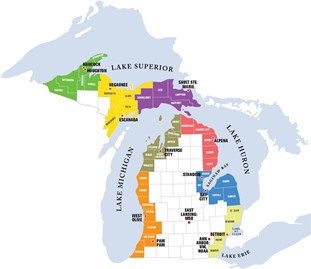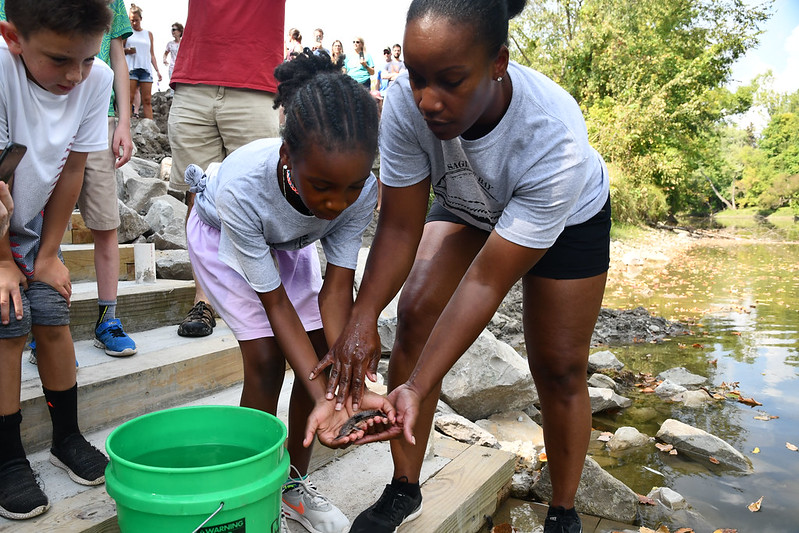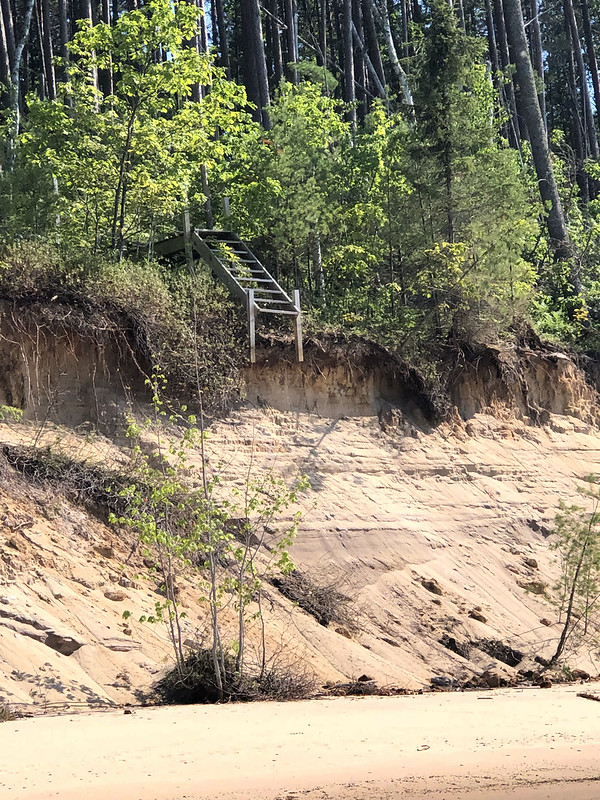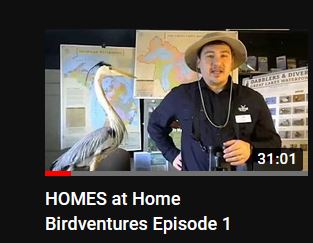Michigan Sea Grant approaches Great Lakes issues with a statewide outlook and a strong local focus
Sea Grant educators partner with many state agencies and other organizations to encourage sustainable use of Michigan’s resources and promote Great Lakes literacy.

Michigan’s Great Lakes coasts aren’t just beautiful — they’re dynamic ecosystems that are home to many species of fish, birds, plants and other wildlife in a variety of habitats. Tourism, commercial and recreational fisheries, rapid development along Michigan’s coasts, fluctuating Great Lakes water levels and an increase in extreme storm events all present opportunities and challenges for those who manage Michigan’s resources.
Environmental stewardship, sustainable economic development and responsible use of the Great Lakes are crucial components of keeping the lakes and the region vibrant. Through research, education and outreach, Michigan Sea Grant (MISG) is dedicated to the protection and sustainable use of the Great Lakes and coastal resources. The partnership between the University of Michigan and Michigan State University to lead MISG has enabled the organization’s success and maximized its impact over the years.
MISG brings together regulators, scientists, policymakers and community members to develop science-based solutions to environmental issues. The program funds research projects and graduate fellowships to investigate pressing challenges affecting coastal ecosystems and communities. MISG educators help K-12 students and their educators connect with the Great Lakes through classroom activities, workshops, lectures, camps and field trips. At MSU, the program is a part of Extension and primarily serves Michigan’s 41 coastal counties through eight coastal districts. MISG’s current strategic focus areas include healthy coastal ecosystems, sustainable fisheries and aquaculture, resilient coastal economies, and environmental literacy and workforce development.
Focus Area: Healthy Coastal Ecosystems
Healthy coastal and Great Lakes ecosystems are the foundation for life along the coast. However, increasingly rapid coastal development and other human activities are leading to water quality degradation, decline of fisheries, wetlands loss, proliferation of invasive species and a host of other challenges. All these issues need to be understood and addressed to restore and maintain coastal and Great Lakes ecosystems. Michigan Sea Grant believes a healthy Great Lakes and coastal ecosystem is critical to Michigan’s economic vision for the future. Recent Sea Grant Extension projects include:

- Habitat restoration initiatives — Michigan Sea Grant has played a major role in reintroducing lake sturgeon to Saginaw Bay and its tributary rivers. MISG coordinated and executed riverside releases of juvenile fish in 2018 and 2019. The releases sparked great interest, with many community organizations and members of the public participating in them. MISG also helped develop a pilot adopt-a-sturgeon program in 2019 to raise funds for hatchery care. After decades of no signs of lake sturgeon in the Saginaw Bay watershed, anglers are once again catching lake sturgeon there. The anglers’ reports are highly encouraging signs of lake sturgeon survival and repopulation and affirm the value of decades of planned restoration work.
- MI Paddle Stewards — MISG launched the MI Paddle Stewards program in 2019 with a series of educational workshops about aquatic invasive species for paddlers around the state. Participants learned to identify common aquatic invasive species, report sightings through a mobile app and properly clean their paddling equipment. After the COVID-19 pandemic halted in-person workshops in 2020, the workshops moved online. One hundred twenty people completed the self-paced online course. As Michigan’s water trails movement grows, the MI Paddle Stewards virtual and in-person training programs are poised to become an important tool in the fight against invasive species.
Focus Area: Sustainable Fisheries and Aquaculture
People use Great Lakes fishery resources in many ways. Recreational, charter, guided, state-licensed commercial and tribal commercial fisheries are the major fishing groups in the Great Lakes. However, subsistence fishing and aquaculture are also part of the landscape. Fisheries are a vital part of the Great Lakes economy, with billions of dollars in economic impact.
Michigan Sea Grant supports the Great Lakes fisheries and seafood supply through teaching about the inextricable connection we have to the lakes; through research that directly or indirectly has an impact on the fisheries; and through outreach, answering questions and staying on top of ongoing and emerging fisheries issues. MISG encourages sound scientific decision-making using fisheries science and fisheries management techniques, such as in its COVID-19 rapid response.
MISG received a $100,000 COVID-19 rapid response grant from the National Sea Grant Office in 2020. These funds allowed MISG to:
- Collaborate with industry associations and other Sea Grant programs to assess and address the needs of fish producers and the charter industry.
- Support projects that connected Great Lakes fish producers directly with consumers.
- Partner with an organization that connects consumers with local food producers.
- Expand existing plans for surveying charter captains to document economic impacts across the season.
Partners indicate this work was helpful in securing $15 million in the second round of federal CARES Act funding for commercial, processor and charter fishery participants in Great Lakes states.
Focus Area: Resilient Communities and Economies
Michigan’s coastal communities provide vital economic, social and recreational opportunities for millions of residents and visitors. Changing Great Lakes water levels, the increased number and intensity of regional storms, and other natural and human hazards are putting more people and property at risk. This has major implications for human safety and the economic and environmental health of coastal communities. To accommodate growing demands on coastal resources, MISG helps communities and policymakers develop new policies, institutional capacities and adaptive management approaches to guide the preservation and use of Great Lakes resources.

It is essential that Michigan residents of coastal communities learn what they can do to reduce their vulnerability and to respond effectively when experiencing hazards. Michigan Sea Grant engages a diverse and growing coastal population in applying the best available scientific knowledge. The organization’s Extension and educational capabilities support the development of resilient communities as shown in the Great Lakes water levels initiative.
In 2020, high water levels were a frequent topic of conversation and great concern around the Great Lakes. Several of the lakes met or set high-water records, and the rest still peaked at levels that damaged infrastructure, eroded vulnerable shorelines, hindered recreation and threatened coastal homes. MISG delivered many presentations and webinars about Great Lakes water levels. A February 2020 water levels presentation had 100 in-person and 40 online participants. The event recording later garnered 2,400 views on Facebook. A virtual presentation about shoreline protection and stabilization drew 435 registrants from five states and one Canadian province. Participants were able to ask questions and learn about possible solutions from experts brought together by MISG. A recording of the presentation posted on YouTube has over 1,000 views.
Focus Area: Environmental Literacy and Workforce Development
A workforce that is literate in science, technology, engineering and mathematics is crucial to maintaining Michigan’s — and America’s — competitiveness and resilience in a rapidly changing global economy. The regional Sea Grant Center for Great Lakes Literacy (CGLL), which Michigan Sea Grant currently leads, along with a commitment to the Great Lakes Literacy Principles of the National Oceanic and Atmospheric Administration, serve as foundations for MISG Extension’s educational programs and partnerships. These efforts include formal and informal educational programs that engage youth and adult audiences through the lens of place-based education.
Through this applied PBE strategy, MISG seeks to enhance student learning, school improvement and community development goals. Youth, educators and learners of all ages are valued as partners in Great Lakes science and research, stewardship and community development efforts. The pandemic caused major upheaval for students and teachers in 2020, and MISG responded quickly to help.

Just weeks after Michigan schools closed in March 2020, MISG designed and delivered a virtual program about the Great Lakes called “H.O.M.E.S at Home” (H@H). The educational program included 13 half-hour webinars that were live-streamed over Zoom and Facebook Live. Each high-energy webinar featured MISG staff and guests delivering a kid-friendly Great Lakes lesson, an at-home craft or activity, and a stewardship component. During March and April 2020, 1,250 participants viewed H@H content. The live broadcasts each reached between 115 and 320 screens, and recordings have been viewed nearly 3,000 times on YouTube and over 8,800 times on Facebook.
Many families wrote to thank MISG for providing reliable, fun programming during a stressful time. Dozens of teachers in the Great Lakes region reported using the videos to supplement classroom instruction.
A Great Lakes-literate person is someone who understands, appreciates, shares about and helps to protect the Great Lakes, the lakes’ resources and the watersheds that feed them. Michigan Sea Grant’s vision is of healthy and sustainable Great Lakes resources achieved through an integrated program that engages universities and public and private sectors.



 Print
Print Email
Email




